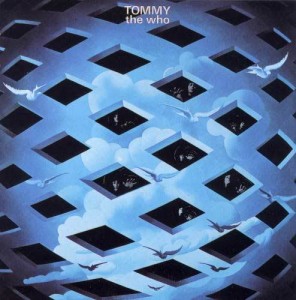
The Album's Artwork Was Created By A Fellow Baba Lover, Mike McInnerny.
Pete Townshend needed an album like Tommy from an intellectual point of view, and The Who needed an album like Tommy from the vantage point of its career. Tommy is regarded as the first “Rock Opera” ever. Endless discussions arise regarding whether or not it deserves that denomination, and whether or not it was the first album that could be termed like that. Leaving the denomination aside, what we have is a collection of songs that came from disparate sources and which the band assembled together as a sort of story with the aid and constant presence of manager Kit Lambert, whose driving force was felt particularly strong on this project.
The main influence might as well have been the teachings of Indian guru Meher Baba. Pete became a Baba lover about a year before the album was first released, and he tried to make the whole work showcase the Compassionate Father’s teachings.
What was the end result? Something which was so difficult to apprehend and so controversial in places that it had to do well in the charts. The difficulty itself was derived from the fact that Baba’s teachings were not that easy to begin with, and when you have them set down by someone who had just “awakened” some noticeable gaps were to be forthcoming. The controversial bits were mainly courtesy of John Entwistle, who penned some “nasty” compositions at the request of Pete, in order to showcase how someone who is different always suffers at the hand of society.
The story revolved around a boy named Tommy Walker, and 40 years later it can be finally understood taking all the interviews and the spin-offs that surfaced into account. Young Tommy witnesses his father kill his mother’s lover when he comes back from the war. The parents tell Tommy he didn’t see or hear anything, and that he is never to say a word to anyone about what he has seen. This turns him into an autistic child, and after trying by hook and by crook to heal him (resorting to religion, taking him to a prostitute, going to a doctor…) the mother cures him after smashing a mirror Tommy always stands in front of, despite being blind. What happens then is that some people consider him a messiah and start a religion with him at the forefront, but they eventually revolt when he starts laying down behavioral rules.
Summing up Tommy in a single paragraph is like narrating a sunset to another person. You can transmit the essence, but what made it special was not the essence but the presence, something which a paragraph could never transmit.
It suffices to say that it was the perfect album as the 60s drew to an end (a fact which was underlined by the memorable performance The Who gave at Woodstock – they hated it, but the public thought otherwise).
The album was one of the most ambitious projects up to its date – it took a long time to be recorded, and maybe only the Rolling Stones and The Beatles had spent so much time on a single project up to that point.
Continue to Part 2 (the analysis of the actual songs and my personal opinion about the album taken as a whole)

Pingback: Tommy (The Who) – Album Review (Part 2) | MusicKO
Pingback: Twitted by MusicKOBlog
Pingback: Live At Leeds (The Who) – Album Review | MusicKO
Pingback: Who Came First (Pete Townshend) – Album Review (Part 1) | MusicKO
Pingback: Tommy (Movie Review) | MusicKO
Pingback: Face Dances (The Who) – Album Review (Part 2) | MusicKO
Pingback: Live At The Isle Of Wight (The Who) – Album Review | MusicKO
Pingback: Empty Glass (Pete Townshend) – Album Review | MusicKO
Pingback: The Iron Man (Pete Townshend) – Album Review (Part 1) | MusicKO
Pingback: The Iron Man (Pete Townshend) – Album Review (Part 2) | MusicKO
Pingback: My Generation – The Very Best Of The Who | MusicKO
Pingback: Odds & Sods (The Who) – Album Review (Part 1) | MusicKO
Pingback: My Five Favorite Who Albums | MusicKO
Pingback: Soundays (Uruguayan Independent Artist) | MusicKO
Pingback: The Village Green Preservation Society (The Kinks) – Album Review | MusicKO